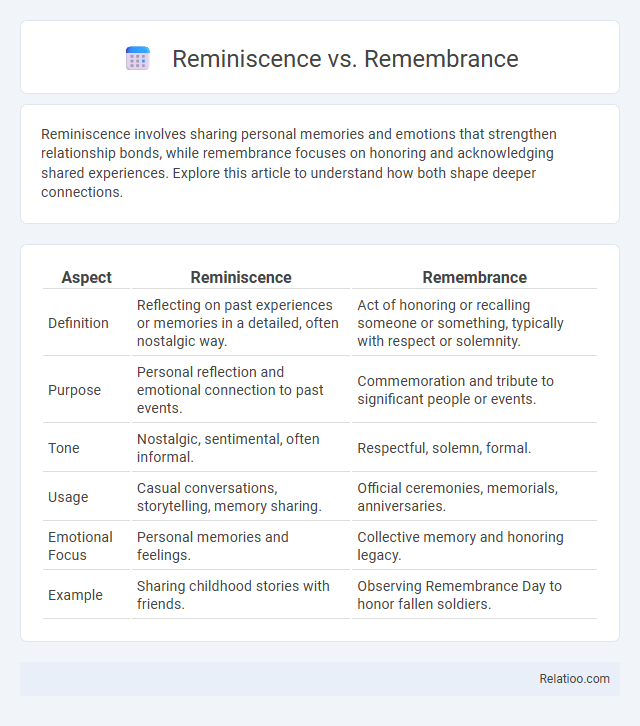Reminiscence involves sharing personal memories and emotions that strengthen relationship bonds, while remembrance focuses on honoring and acknowledging shared experiences. Explore this article to understand how both shape deeper connections.
Table of Comparison
| Aspect | Reminiscence | Remembrance |
|---|---|---|
| Definition | Reflecting on past experiences or memories in a detailed, often nostalgic way. | Act of honoring or recalling someone or something, typically with respect or solemnity. |
| Purpose | Personal reflection and emotional connection to past events. | Commemoration and tribute to significant people or events. |
| Tone | Nostalgic, sentimental, often informal. | Respectful, solemn, formal. |
| Usage | Casual conversations, storytelling, memory sharing. | Official ceremonies, memorials, anniversaries. |
| Emotional Focus | Personal memories and feelings. | Collective memory and honoring legacy. |
| Example | Sharing childhood stories with friends. | Observing Remembrance Day to honor fallen soldiers. |
Understanding Reminiscence and Remembrance
Reminiscence involves the act of recalling past experiences, often with a focus on personal memories and emotions, serving as a cognitive process that enriches self-identity. Remembrance, on the other hand, emphasizes the intentional honoring or commemoration of people or events, frequently observed during ceremonies or memorials. Understanding the distinction highlights reminiscence as an internal reflection, while remembrance functions as an external acknowledgment or tribute.
Key Differences Between Reminiscence and Remembrance
Reminiscence involves recalling past experiences often with emotional or nostalgic undertones, while remembrance emphasizes honoring or commemorating someone or something, usually in a formal context. The key difference lies in reminiscence as a personal, introspective act of memory, whereas remembrance serves a public or ceremonial function aimed at preserving legacy. Both terms relate to memory but differ fundamentally in intent and social application.
The Psychology Behind Reminiscence
Reminiscence involves the cognitive process of recalling personal memories, often enhancing psychological well-being by reinforcing identity and emotional resilience. Remembrance typically refers to the purposeful act of honoring or commemorating past events or individuals, engaging emotional and social dimensions of memory. The psychology behind reminiscence highlights its therapeutic potential in aging populations, promoting mental health through reflection, narrative construction, and the reinforcement of meaningful life experiences.
The Emotional Impact of Remembrance
Remembrance evokes a deep emotional impact by connecting you with significant personal or collective memories, often tied to honoring loved ones or historic events. Unlike reminiscence, which involves leisurely reflecting on past experiences, remembrance carries a more solemn and respectful tone that strengthens emotional bonds and fosters a sense of gratitude. This profound emotional resonance makes remembrance essential for processing grief and preserving meaningful connections across time.
Cultural Perspectives on Reminiscence and Remembrance
Reminiscence and remembrance hold distinct cultural connotations, with reminiscence often associated with personal reflection and storytelling, while remembrance tends to emphasize collective memory and formal ceremonies. In many cultures, reminiscence serves as an intimate, informal practice that strengthens family bonds through shared memories, whereas remembrance is institutionalized in rituals like memorials and national holidays to honor historical events. These cultural perspectives shape how individuals and communities engage with the past, influencing practices of memory preservation and identity formation.
Reminiscence in Therapy and Well-being
Reminiscence involves recalling past experiences to enhance mental well-being and is widely used in therapeutic settings, especially for older adults. This technique helps improve cognitive function, reduce depression, and foster a sense of identity and continuity by encouraging individuals to share personal memories. Your engagement in reminiscence therapy can promote emotional healing and strengthen social connections, making it a valuable tool in mental health care.
Remembrance in Rituals and Memorials
Remembrance in rituals and memorials serves as a powerful cultural practice designed to honor and preserve the memory of individuals or significant events, often marked by ceremonies, monuments, and moments of silence. Your participation in remembrance rituals fosters communal solidarity and ensures that historical narratives remain alive across generations. Unlike reminiscence, which is personal reflection, or reminiscence therapy used in clinical settings, remembrance emphasizes collective memory and respect within societal traditions.
Personal Narratives: Stories of Reminiscence
Personal narratives of reminiscence vividly capture your lived experiences, focusing on sensory details and emotions that bring memories to life. Reminiscence involves recalling specific moments that shaped your identity, while remembrance often centers on honoring significant events or people. These stories create a deeply personal connection by highlighting the nuanced interplay between memory and identity.
Collective Memory: Shared Acts of Remembrance
Collective memory involves shared acts of remembrance that unify communities through common experiences and historical events. Reminiscence emphasizes personal reflection on past experiences, while remembrance focuses on deliberate ceremonies or rituals to honor and preserve collective history. Your participation in acts of remembrance strengthens social bonds and cultural identity within a group.
Choosing Between Reminiscence and Remembrance in Practice
Reminiscence involves the act of recalling past experiences in a reflective or narrative way, often highlighting personal stories and emotions, while remembrance emphasizes honoring or commemorating significant events or individuals, typically in a formal or solemn context. Choosing between reminiscence and remembrance depends on the purpose: use reminiscence for informal, personal reflection or storytelling and remembrance for official ceremonies, memorials, or moments of tribute. Effective communication requires aligning the term with the intended emotional tone and context to ensure clarity and appropriate resonance with the audience.

Infographic: Reminiscence vs Remembrance
 relatioo.com
relatioo.com